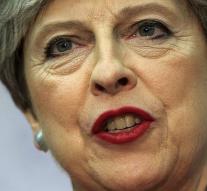
Fiasco for May
london - The Conservatives lose their majority in the British parliament. The rise of a huge crowd of younger voters has led the opposition party Labor to perform much better than expected. It is still unclear whether the Conservatives can find allies to form a majority.
The defeat for the Conservatives, who remains the biggest party at a distance, is being charged premier Theresa May personally. She took two months ago the decision to cancel interim elections. At that time her party stood in the polls. Due to May's little charismatic performance and a number of flaters during the campaign, the lead disappeared very gradually.
Labor leader Jeremy Corbyn sees the result as a reason for May to resign as prime minister. He thinks Labor, who won more than 30 seats, would form a government. However, no logical coalition is conceivable that would help the Labor to a necessary majority.
This is due to the huge loss of Scottish nationalists. The SNP saw the number of seats in the 2015 elections rise from 6 to 56. There are more than 30 of them left after Thursday's elections. Most of the Scottish SNP seats went to the Conservatives. The Scottish result is seen by analysts as the death stamp of the wish of Scottish SNP Prime Minister Nicola Sturgeon to write a new referendum on independence.
British elections always cause personal drama. The British district system ensures that there is no single election, but actually 650 different elections. These can be decided by very special local themes. For example, former Lib Dem party leader and vice president Nick Clegg lost his seat in student city of Sheffield, where many young people voted and lost SNP group leader Angus Robertson's seat in Northeast Scotland.
The Lib Dems made some of the loss of the previous elections good. Then the party lost the lion's share of the 56 seats that won the Lib Dems in 2010. Initially, the party seemed to double the current number of seats to fourteen seats. Eventually, some seats become smaller.
Ukip, the party that declined before the departure of the British from the EU for decades, saw its support tremendously. The party did not have any seat in the Lagerhuis this time. For a long time, it was expected that most Ukip voters would switch to the Conservatives. But also Labor, which did not claim to oppose Brexit, got the support of many former 'kippers'.

Leave a comment